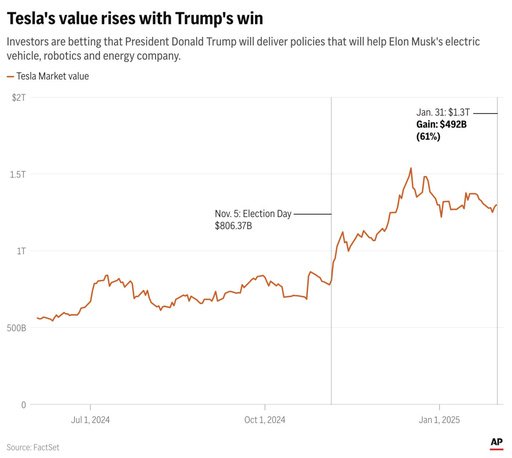NEW YORK — Enthusiasts of Elon Musk are watching closely as the stock market value of Tesla has surged dramatically, reaching a staggering half a trillion dollars since the recent presidential election. This remarkable increase persists even after the company released a less-than-stellar financial report that would have typically led to a decline for other corporations in the market. Investors are optimistic that President Donald Trump’s initiatives to reduce numerous Washington regulations and impose tariffs will ultimately favor Musk’s enterprise rather than hinder it.
The notion of decreased regulation has investors thrilled, while the prospect of a trade conflict is seen as manageable. “This is poised to be an incredible era for Tesla and Musk,” noted Dan Ives, a financial analyst at Wedbush Securities. He expressed his enthusiasm following an investor conference call, stating that he had never witnessed Musk sounding more optimistic.
Investing in Tesla has always carried a degree of uncertainty. Many doubted Musk’s ability to build a successful electric vehicle business, let alone elevate it to become the most valuable car manufacturer in the world, alongside making him the richest individual globally. Nonetheless, this latest investment seems especially precarious. Musk suggests that the company’s real worth lies in the future of Tesla’s robotics and ambitions for fully autonomous vehicles. During Tesla’s recent investor call, he assured stakeholders that robotaxis would be introduced in Austin, Texas, by June and rolled out nationwide by the end of 2025.
Proponents believe that Trump’s influence will enhance Musk’s vision, particularly as Musk has been granted an office at the White House and appointed to lead a new government efficiency department aimed at streamlining the government. Trump’s transportation secretary, Sean Duffy, has reiterated his commitment to reducing excessive regulation for automakers and establishing a uniform federal framework for autonomous vehicle technology, which Musk believes has been hindered by inconsistent state laws.
However, the Trump administration’s policy changes may not be entirely beneficial for Musk. The president has proposed eliminating a $7,500 federal tax incentive that encourages the purchase of electric vehicles and plans to relax emission standards, which would jeopardize Tesla’s revenue from selling regulatory credits to traditional automakers who do not meet these standards. Notably, in the final quarter of 2024 alone, Tesla generated $692 million from these credits, reflecting a substantial increase from the previous year.
Concerns linger about potential investigations into Tesla, particularly around its self-driving technology, which has been dubbed misleading due to the need for human drivers in certain situations. The National Highway Traffic Safety Administration began probes into the Full Self-Driving technology following reports of vehicle crashes, including one fatal incident involving a pedestrian.
Duffy assured senators earlier this month that the investigations will follow objective facts rather than political pressures, especially given Musk’s close ties to the president. Musk will likely need extensive support from Trump, especially considering that Tesla revealed a drop in sales in January, marking the first decline in over a decade, as competition from manufacturers like BMW, Volkswagen, and China’s BYD increases.
Despite Tesla’s disappointing earnings report for the latter quarter of 2024, which fell below analysts’ forecasts, the company’s stock continued to rise, showcasing a unique resilience. “What would typically hurt other automakers doesn’t seem to affect Tesla,” remarked Morningstar analyst Seth Goldstein.
Nevertheless, shareholders also remain vigilant about Musk’s public persona and political engagements. In Europe, where Tesla faces stiff competition, Musk has shown controversial political support, which raises questions about the potential impact on customer sentiment. As Musk’s political involvement intensifies, analysts are pondering the implications for Tesla’s brand image and sales.
As questions surrounding investor confidence in Musk grow, the stakes are high. The explosive growth of Tesla’s stock post-election has surpassed the annual economic output of 160 countries, bringing the total market value of the company to approximately $1.3 trillion—greater than the combined valuation of prominent automotive companies including General Motors, BMW, and Ford.
Musk believes that the stock could climb even higher, confidently stating, “I see a scenario where Tesla becomes the world’s most valuable company by a considerable margin.” Currently, Tesla ranks as the seventh-most valuable firm within the S&P 500 index.
Ives speculates that the trajectory appears promising, confirming his belief that the stock’s value will continue to rise. “The ambitious gamble Musk has made is on Trump’s administration,” he concluded, regarding Musk’s predicted influence on deregulation and its potential trillion-dollar impact.




